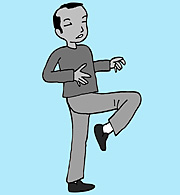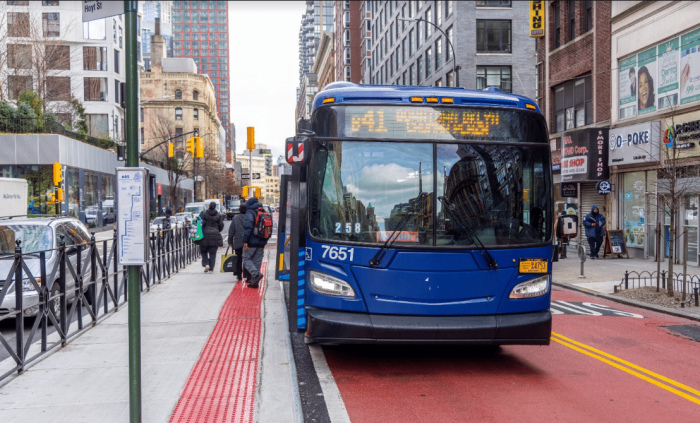Seeing them in Prospect Park, their figures posed in unison, a passerby might assume they were just an early morning exercise group. But all that stretching is actually a faith.
Falun Gong consists of a series of five exercises and a dedication to three principles: Truthfulness, Benevolence and Forbearance.
Li Hongzhi founded the faith in 1992 in China, where the state banned it in 1999 out of fear that widespread practice would undermine the government. The event that sparked the ban was a 10,000-strong session in the heart of Beijing calling attention to recent violence against Falun Gong practitioners. Since being banned, there have been many reports of torture and violence against members of the faith.
Though there are said to be 100 million Falun Gong followers across the world, no one knows how many are here in New York. But finding a local group is easy, as members are very open to teaching others about the religion, and practice sites can be easily tracked down via falundafa.org (there are four in Brooklyn).
The exercises — Buddha Showing a Thousand Hands, the Falun Standing Stance, Penetrating the Two Cosmic Extremes, the Great Heavenly Circuit and Strengthening Divine Powers — are the most recognizable emblems of the faith. With the text, they create a path toward changing one’s xinxing, or moral standard — moving people to use the three principles in all aspects of their lives, Clearine Hunter said.
Hunter and Betty Hunter-Beatty, sisters from Crown Heights, have been practicing in their basement since March 2000, after seeing a group doing the tai chi–like exercises in Prospect Park.
Hunter spoke of the nonchalant nature of the faith. There is no central building and members are responsible for their own self-improvement, cultivated through the exercises.
“The exercises open up all the energy channels in the body,” Hunter said.
Practitioners describe a lightness of being, an ethereal quality produced by performing the exercises.
Quan Sha, who joined the Falun Gong faith after moving to New York from China in 1997, certainly has this laid-back attitude.
Back home, she said, she didn’t have time to search for answers. “But in my heart, I always looked for something special, something spiritual,” she said while seated on a carpet square in Hunter-Beatty’s basement.
Sha, Colin Fredericson and Lillian Simmons sat in the basement with the two sisters, as they do most Tuesdays and Thursdays, to recite from “Zhuan Falun,” one of the faith’s sacred texts. Reading — sometimes in unison in a droning monotone, sometimes switching off — the group recited maxims they are loath to have quoted, in case they are taken out of context.
Most perform the exercises every day, but only make it to the top of Prospect Park’s Long Meadow on weekends. When a group comes together, they feel the “energy field is much stronger,” Sha said.
Simmons, a special-education teacher from East Flatbush, was introduced to the faith by Hunter, and said she was first drawn in by the exercises.
“After doing them for a certain length of time — and it doesn’t have to be long — your body is energized to the point where you can be stressed, then you do the standing exercise and feel your body open up,” she explained. “It’s revitalizing.”
Colin Fredericson, a student living in Park Slope, was raised in a loosely Jewish home, and found Falun Gong in 2003 while studying in Florida.
“My family is not very strict religiously,” said Fredricson, framed by the wood paneling and lavender drywall behind him. “They supported me because they saw that [practicing the faith] helped me” relieve stress and feel content.
Like the sisters, most of the practitioners who gather in Hunter-Beatty’s basement have families that aren’t members. While they stress that the religion is for everyone, including families, they insist the faith revolves around the individual.
“It is an individual practice,” Simmons said. “We are upgrading ourselves; others can’t help us improve.”
With self-improvement in mind, the faithful gathered in Hunter-Beatty’s basement bounce comfortably between levity and gravity, content in their self-cultivation but wary of the image they might evoke.
They are at once closed off about certain details of their lives — and the faith — and completely open about others. They scoff incredulously at questions asked from an ignorant point of view while at the same time relishing the opportunity to explain their faith.
While observation might reveal a certain set of shared characteristics, Hunter-Beatty said it can be dangerous to think of the faith as collective.
“My understanding is very different than everyone else’s understanding,” she said. “If all of us thought alike, we would be something that the Communist Party has said that we are: a cult — which we are not.”
While Falun Gong brings its members clarity and happiness, they are constantly reminded of the atrocities committed against their brethren in China.
A 2006 report concluded “there has been and continues today to be large scale organ seizures from unwilling Falun Gong practitioners.” Of all the atrocities committed against members of her faith, Hunter-Beatty finds the persecution of women particularly appalling. She spoke of mothers separated from children, gang rape and death.
“If it were any other group of women, it would be all over the newspaper,” she said. “But because it’s not in the news, people have the tendency to believe that it’s not true.”
Falun Gong members raise awareness by holding press conferences and demonstrations, contacting politicians to bring these atrocities to light, and sometimes even sitting in cages in front of Rupert Murdoch’s News Corporation headquarters in Manhattan.
But that’s a world away from a sleepy block in Crown Heights, where five practitioners examine their faith, cleanse their spirits and think of their brethren far away.























